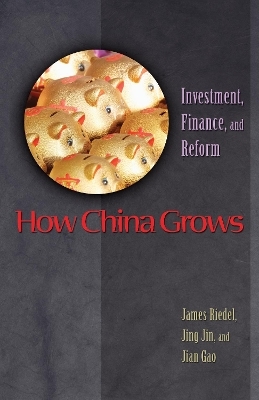
How China Grows
Investment, Finance, and Reform
Seiten
2023
Princeton University Press (Verlag)
978-0-691-24806-6 (ISBN)
Princeton University Press (Verlag)
978-0-691-24806-6 (ISBN)
Is China's growth sustainable, or has China relied too much on investment, which is subject to diminishing returns, and not enough on technological change? Dealing with the relation between investment, finance, and growth in China, this book dismisses this concern.
Why investment and financial reform are essential to China's continued economic well-being
Although China's economy has grown spectacularly over the last twenty-five years, economists disagree about how the Chinese economy is likely to fare in the short- and long-term future. Is China's growth sustainable, or has China relied too much on investment, which is subject to diminishing returns, and not enough on technological change? The first book on the relation between investment, finance, and growth in China, How China Grows dismisses this concern. James Riedel, Jing Jin, and Jian Gao argue that investment has not only been the engine of growth, but also the main source of technological progress and structural change in China.
What threatens future growth instead, the authors argue, are the weaknesses of China's financial system that undermine efficiency in investment allocation. Financial-sector reform and development are necessary, not only for sustaining long-term growth, but also for maintaining macroeconomic stability.
Although it includes some technical economic analysis, How China Grows is accessible to noneconomists and will benefit anyone who is interested in development finance in general and in China's economic growth in particular—whether economists, political scientists, bankers, or business people.
Why investment and financial reform are essential to China's continued economic well-being
Although China's economy has grown spectacularly over the last twenty-five years, economists disagree about how the Chinese economy is likely to fare in the short- and long-term future. Is China's growth sustainable, or has China relied too much on investment, which is subject to diminishing returns, and not enough on technological change? The first book on the relation between investment, finance, and growth in China, How China Grows dismisses this concern. James Riedel, Jing Jin, and Jian Gao argue that investment has not only been the engine of growth, but also the main source of technological progress and structural change in China.
What threatens future growth instead, the authors argue, are the weaknesses of China's financial system that undermine efficiency in investment allocation. Financial-sector reform and development are necessary, not only for sustaining long-term growth, but also for maintaining macroeconomic stability.
Although it includes some technical economic analysis, How China Grows is accessible to noneconomists and will benefit anyone who is interested in development finance in general and in China's economic growth in particular—whether economists, political scientists, bankers, or business people.
James Riedel is Professor of International Economics at Johns Hopkins University's School of Advanced International Studies. Jing Jin is Director of China Strategy for UBS AG Hong Kong, and a professor at Beijing's Central University of Finance and Economics. Jian Gao is Vice-Governor of the China Development Bank in Beijing.
| Erscheinungsdatum | 10.07.2023 |
|---|---|
| Zusatzinfo | 72 b/w illus. 18 tables. |
| Verlagsort | New Jersey |
| Sprache | englisch |
| Maße | 140 x 216 mm |
| Themenwelt | Wirtschaft ► Betriebswirtschaft / Management ► Finanzierung |
| Wirtschaft ► Volkswirtschaftslehre | |
| ISBN-10 | 0-691-24806-0 / 0691248060 |
| ISBN-13 | 978-0-691-24806-6 / 9780691248066 |
| Zustand | Neuware |
| Informationen gemäß Produktsicherheitsverordnung (GPSR) | |
| Haben Sie eine Frage zum Produkt? |
Mehr entdecken
aus dem Bereich
aus dem Bereich
Allgemeines Steuerrecht, Abgabenordnung, Umsatzsteuer
Buch (2024)
Springer Gabler (Verlag)
CHF 39,20
Band 1: Grundlagen der Besteuerung, Ertragsteuern
Buch | Softcover (2024)
Vahlen (Verlag)
CHF 41,70
Investition, Finanzierung, Finanzmärkte und Steuerung
Buch | Softcover (2022)
Vahlen (Verlag)
CHF 55,70


